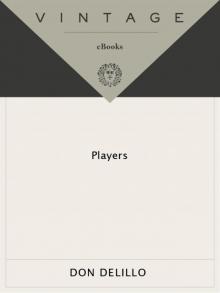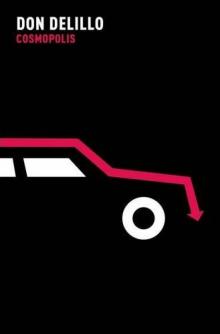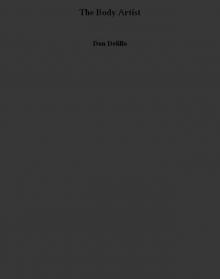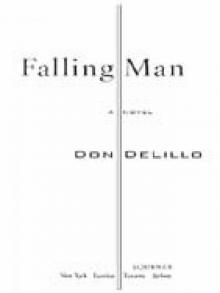- Home
- Don DeLillo
Cosmopolis Page 4
Cosmopolis Read online
Page 4
Two women came out of Yodo of Japan, then went back in.
Eric looked at the man. He wanted Torval to shoot him or put the weapon at least to his head. He said, "Who the fuck are you?"
"Dr. Ingram."
"Where is Dr. Nevius?"
"Called away suddenly. Personal matter."
"Speak slowly and clearly."
"Called away suddenly. I don't know Family crisis. I'm the associate."
Eric thought about this.
"I flushed out your ear holes once."
Eric looked at Torval and nodded briefly. Then he raised the window.
He sat stripped to the waist. Ingram opened the satchel to a set of vivid instruments. He put the stethoscope to Eric's chest. He realized, Eric did, why his undershirt was missing. He'd left it on the floor of Didi Fancher's bedroom.
He looked past Ingram while the doctor listened to his heart valves open and close. The car moved incrementally westward. He didn't know why stethoscopes were still in use. They were lost tools of antiquity, quaint as bloodsucking worms.
Jane Melman said, "You do this what."
"What. Every day."
"No matter."
"Wherever I am. That's right. No matter."
She tipped back her head and plunged a bottle of spring water into the middle of her face.
Ingram did an echocardiogram. Eric was on his back, with a skewed view of the monitor, and wasn't sure whether he was watching a computerized mapping of his heart or a picture of the thing itself. It throbbed forcefully on-screen. The image was only a foot away but the heart assumed another context, one of distance and immensity, beating in the blood plum raptures of a galaxy in formation. What mystery he glimpsed in this functional muscle. He felt the passion of the body, its adaptive drive over geologic time, the poetry and chemistry of its origins in the dust of old exploding stars. How dwarfed he felt by his own heart. There it was and it awed him, to see his life beneath his breastbone in image-forming units, hammering on outside him.
He said nothing to Ingram. He didn't want to talk to the associate. He talked to Nevius now and then. Nevius had definition. He was white-haired, tall and stalwart, with a trace of Middle Europe in his voice. Ingram spoke in mutters of instruction. Breathe deep. Turn left. It was hard for him to say something he hadn't already said, words arranged in the same tedious sequence, a thousand times before.
Melman said, "So you do what. Same routine every day.
"Varies, depending."
"So he comes to your house, nice, on weekends."
"We die, Jane, on weekends. People. It happens."
"You're right. I didn't think of that."
"We die because it's the weekend."
He was still on his back. She sat facing the top of his head, speaking to a point slightly above it.
"I thought we were moving. But we're not anymore." "The president's in town."
"You're right. I forgot. I thought I saw him when I ran out of the park. There was an entourage of limousines going down Fifth, with a motorcycle escort. I thought all these limos for the president I can understand. But it was somebody famous's funeral."
"We die every day," he told her.
He sat on the table now and Ingram looked for swollen lymph nodes under his arms. Eric pointed out a plug of sebum and cell debris on his lower abdomen, a blackhead, slightly sinister.
"What do we do about this?"
"Let it express itself."
"What. Do nothing."
"Let it express itself," Ingram said.
Eric liked the sound of that. It was not unevocative. He tried to notice the associate. He had a mustache, for example. Eric hadn't seen it until now He expected to see glasses as well. But the man did not wear glasses although he seemed to be someone who should, based on facial typology and general demeanor, a man who'd worn glasses since early boyhood, looking overprotected and marginalized, persecuted by the other kids. He was a man you'd swear wore glasses.
He asked Eric to stand. He adjusted the examining table to half length. Then he asked him to drop his pants and shorts and to bend over the near end of the table, legs apart.
He did this and was facing his chief of finance.
She said, "So look. We have two rumors working in our favor. First there's bankruptcies for six straight months. More each month. More on the way. Large Japanese corporations. This is good."
"The yen has to drop."
"This is loss of faith. It will force the yen to drop."
"The dollar will settle up."
"The yen will drop," she said.
He heard a slidy rustle of latex. Then the Ingram finger entered.
"Where is Chin?" she said.
"Working on visual patterns."
"This thing doesn't chart."
"It charts."
"It doesn't chart the way you chart technology stocks. You can find real patterns there. Locate predictable components. This is different."
"We are teaching him to see."
"You should do the seeing. You're the seer. What is he? A kid. He has the streak in the hair. He has the earring."
"He doesn't have the earring."
"If he was any more dreamy, we'd have to put him on life support."
He said, "What's the second rumor?"
Ingram examined the prostate for signs. He palpated, the finger slyly prodding the surface of the gland through the rectal wall. There was pain, probably just muscles tensing in the anal canal. But it hurt. It was pain. It traveled the circuitry of nerve cells. From his stooped position, Eric looked directly into Jane's face. He liked doing this, which surprised him. In the office she was an edgy presence, skeptical, adversarial, aloof, with a gift for sustained complaint. Here, she was a single running mother in a foldout seat, knock-kneed and touchingly, somehow, gaunt. A splash of hair lay moist and flat on her forehead, showing the first faint veining of gray. The water bottle dangled from a lank hand.
She did not recede from his gaze. She made complete eye contact. Her clavicle showed knobby above the droop of her tank top. He wanted to lick the sweat off the inside of her wrist. She was wrists and shinbones and unbalmed lips.
"There's a rumor it seems involving the finance minister. He's supposed to resign any time now," she said. "Some kind of scandal about a misconstrued comment. He made a comment about the economy that may have been misconstrued. The whole country is analyzing the grammar and syntax of this comment. Or it wasn't even what he said. It was when he paused. They are trying to construe the meaning of the pause. It could be deeper, even, than grammar. It could be breathing."
When Nevius did the finger, it was in and out in seconds. Ingram was probing for some murky fact. Jane was the fact. She had the bottle in her crotch, knees flopped outward now, and watched him. Her mouth was open, showing large gapped teeth. Something passed between them, deeply, a sympathy beyond the standard meanings that also encompassed these meanings, pity, affinity, tenderness, the whole physiology of neural maneuver, of heartbeat and secretion, some vast sexus of arousal drawing him toward her, complicatedly, with Ingram's finger up his ass.
"So the whole economy convulses," she said, "because the man took a breath."
He felt these things. He felt the pain. It traveled the pathways. It informed the ganglion and spinal cord. He was here in his body, the structure he wanted to dismiss in theory even when he was shaping it under the measured effect of barbells and weights. He wanted to judge it redundant and transferable. It was convertible to wave arrays of information. It was the thing he watched on the oval screen when he wasn't watching Jane.
"You grip the water bottle."
"It's that soft type plastic."
"You grip it. You choke it."
"It's a matter-of-fact thing."
"It's sexual tension."
"It's everyday nervousness in a life."
"It's sexual tension," he said.
He told Ingram to reach over with his free hand and fish the sunglasses out of the suit jack
et on the hanger nearby. The associate managed to do this. Eric put on the glasses.
"Days like this."
"What?" she said.
"My mood shifts and bends. But when I'm alive and heightened, I'm super-acute. Do you know what I see when I look at you? I see a woman who wants to live shamelessly in her body. Tell me this is not the truth. You want to follow your body into idleness and fleshiness. That's why you have to run, to escape the drift of your basic nature. Tell me I'm making it up. You can't do that. It's there in your face, all of it, the way it rarely shows in any face. What do I see? Something lazy, sexy and insatiable."
"I'm comfortable with that."
"This is the woman you are inside the life. Looking at you, what? I'm more excited than I've been since the first burning nights of adolescent frenzy. Excited and confused. I look at you and feel an erection stirring even as the situation argues strenuously against it."
"It can't afford to be hard. It won't allow itself psychologically," she said. "It knows what's going on back there."
"All the same. Days like this. I look at you and feel electric. Tell me you don't feel it too. The minute you sat there in that whole tragic regalia of running. That whole sad business of Judeo-Christian jogging. You were not born to run. I look at you. I know what you are. You are sloppy-bodied, smelly and wet. A woman who was born to sit strapped in a chair while a man tells her how much she excites him."
"How come we've never spent this kind of time together?"
"Sex finds us out. Sex sees through us. That's why it's so shattering. It strips us of appearances. I see a near naked woman in her exhaustion and need, stroking a plastic bottle pressed between her thighs. Am I honor-bound to think of her as an executive and a mother? She sees a man in a posture of rank humiliation. Is that who I think he is, pants around his ankles and butt flung back? What are the questions he asks himself from this position in the world? Large questions maybe. Questions such as science obsessively asks. Why something and not nothing? Why music and not noise? Beautiful questions strangely suited to his low moment. Or is he limited in perspective, thinking only about the moment itself? Thinking about the pain."
The pain was local but seemed to absorb everything around it, organs, objects, street sounds, words. It was a point of hellish perception that was steady-state, unchanging in degree, and not a point at all but some bundled other brain, a counter-consciousness, but not that either, located at the base of his bladder. He operated from within. He could think and speak of other things but only within the pain. He was living in the gland, in the scalding fact of his biology.
"Does he regret surrendering his dignity and pride? Or is there a secret wish for self-abasement?" He smiled at Jane. "Is his manhood a sham? Does he love himself or hate himself? I don't think he knows. Or it changes minute to minute. Or the question is so implicit in everything he does that he can't get outside it to answer."
He thought he was serious. He did not think he was speaking for effect. These were serious questions. He knew they were serious but was not sure.
"Days like this. He snaps a finger and a flame shoots up. Every sensitivity, all his attunements. Things are ready to happen that normally never do. She knows what he means, that they don't even have to touch. The same thing that's happening to him is happening to her. She doesn't need to crawl under the table and suck his dick. Too trite to interest either one of them. The flow is strong between them. The emotional tone. Let it express itself. He sees her in her wallow and feels his pelvic muscles begin to quiver. He says, Tell me to stop and I'll stop. But he doesn't wait for her to reply. There isn't time. The tails of his sperm cells are lashing already. She is his sweetheart and lover and slut undying. He doesn't have to do the unspeakable thing he wants to do. He only has to speak it. Because they're beyond every model of established behavior. He only has to say the words."
"Say the words."
"I want to bottle-fuck you slowly with my sunglasses on.
Her feet flew out from under her. She uttered a thing, a sound, herself, her soul in rapid rising inflection.
He saw his face on the screen, eyes closed, mouth framed in a soundless little simian howl.
He knew the spycam operated in real time, or was supposed to. How could he see himself if his eyes were closed? There wasn't time to analyze. He felt his body catching up to the independent image.
Then man and woman reached completion more or less together, touching neither each other nor themselves.
The associate tore the glove off his hand and slapped it in the waste bin, the rip and the discard, dark with meaning.
Horns were blowing up and down the street. Eric began to dress, waiting for Ingram to use the word asymmetrical. But he said nothing. His real doctor, Nevius, had used the word once, in palpation, without elaborating. He saw Nevius nearly every day but had never asked what the word implied.
He liked to track answers to hard questions. This was his method, to attain mastery over ideas and people. But there was something about the idea of asymmetry. It was intriguing in the world outside the body, a counterforce to balance and calm, the riddling little twist, subatomic, that made creation happen. There was the serpentine word itself, slightly off kilter, with the single additional letter that changes everything. But when he removed the word from its cosmological register and applied it to the body of a male mammal, his body, he began to feel pale and spooked. He felt a certain perverse reverence toward the word. A fear of, a distance from. When he heard the word spoken in a context of urine and semen and when he thought of the word in the shadow of pissed pants, one, and limp-dick desolation, two, he was haunted to the point of superstitious silence.
He took off his sunglasses and looked closely at Ingram. He tried to read his face. It was empty of affect. He thought of putting his sunglasses on the associate's face, to make him real, give him meaning in the sweep of other people's perceptions, but the glasses would have to be clear and thicklensed and life-defining. If you knew the man ten years, it might take you all that time to notice he did not wear glasses. It was a face that was lost without them.
It was not Ingram who spoke. It was Jane Melman, pausing at the open door before she resumed her interrupted run.
"I want to say something that is deeply uncomplicated. There is time to choose. You can ease off and take a loss and come back stronger. It is not too late. You can make this choice. You've done great work for our investors in strong and choppy markets both. Most asset managers underperform the market. You've outperformed it, consistently, and you've never been influenced by the sweep of the crowd. This is one of your gifts."
He was not listening. He was looking past her to a figure at the cash machine outside the Israeli bank on the northeast corner, a slight man mumbling in his teeth.
"We've profited, we've flourished even as other funds have stumbled," she said. "Yes, the yen will fall. I don't think the yen can go any higher. But in the meantime you have to draw back. Pull back. I am advising you in this matter not only as your chief of finance but as a woman who would still be married to her husbands if they had looked at her the way you have looked at me here today."
He was not looking at her now. She shut the door and began running north on Fifth Avenue, past the shabby man at the ATM. There was something familiar about him. It wasn't his khaki field jacket or paper-shredded hair. Maybe it was his slouch. But Eric didn't care whether this was someone he'd once known. There were many people he'd once known. Some were dead, others in forced retirement, spending quiet time alone in their toilets or walking in the woods with their three-legged dogs.
He was thinking about automated teller machines. The term was aged and burdened by its own historical memory. It worked at cross-purposes, unable to escape the inference of fuddled human personnel and jerky moving parts. The term was part of the process that the device was meant to replace. It was anti-futuristic, so cumbrous and mechanical that even the acronym seemed dated.
Ingram folded the examining table
back into the cabinet. He packed his satchel and went out the door, turning briefly to look at Eric. He was stationary, only a couple of feet away, but already lost in the crowd, forgotten even as he spoke, wide-eyed, with studied detachment in his voice.
"Your prostate is asymmetrical," he said.
2
The Confessions of Benno Levin
NIGHT
He is dead, word for word. I turned him over and looked at him. His eyes were mercifully closed. But what does mercy have to do with it? There was a brief sound in his throat that I could spend weeks trying to describe. But how can you make words out of sounds? These are two separate systems that we miserably try to link.
This resembles something he would say. I must be mouthing his words again. Because I'm sure he said it once, walking past my workstation to the person who was with him, in reference to such and such. Mirrors and images. Or sex and love. These are two separate systems that we miserably try to link.
Allow me to speak for myself. I had a job and a family. I struggled to love and provide. How many of you know the true and bitter force of that simple word provide? They always said I was erratic. He is erratic. He has problems of personality and hygiene. He walks, whatever, funny. I never heard a single one of these statements but knew they were being made the way you sense something in a person's look that does not have to be spoken.
I made a phone threat that I didn't believe. They took the threat to be credible, which I knew they had to do, considering my knowledge of the firm and the personnel. But I didn't know how to track him down. He moved about the city without pattern. He had armed escorts. The building where he lived was unapproachable in my current state of randomized attire. And I accepted this. Even at the firm, it was not easy to find his office. It changed all the time. Or he voided it to work elsewhere, or work wherever he happened to be, or work at home in the annex because he did not really separate live and work, or to travel and think, or to spend time reading in his rumored lake house in the mountains.

 Great Jones Street (Contemporary American Fiction)
Great Jones Street (Contemporary American Fiction) Americana
Americana Running Dog
Running Dog Libra
Libra End Zone
End Zone Ratner's Star
Ratner's Star Underworld
Underworld White Noise
White Noise Players
Players Cosmopolis
Cosmopolis The Silence
The Silence Mao II
Mao II Zero K
Zero K Great Jones Street
Great Jones Street The Angel Esmeralda
The Angel Esmeralda The Names
The Names The Body Artist
The Body Artist Point Omega
Point Omega Falling Man
Falling Man